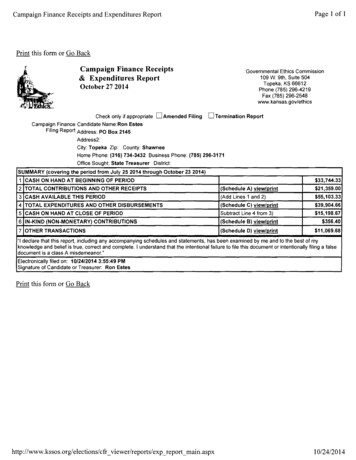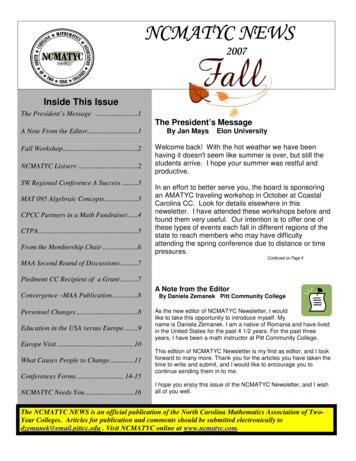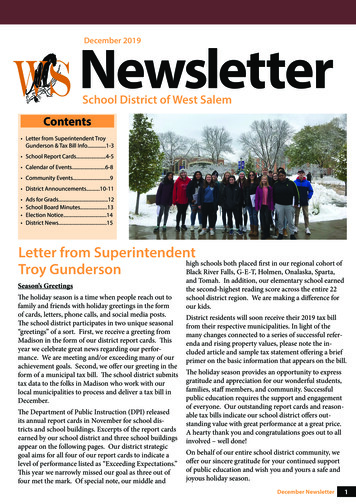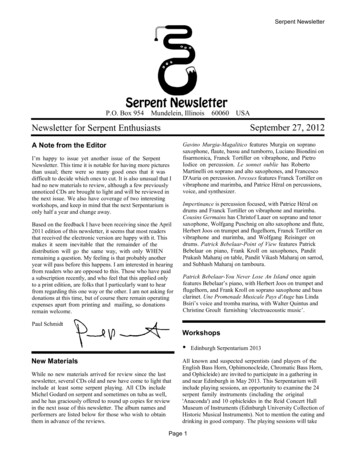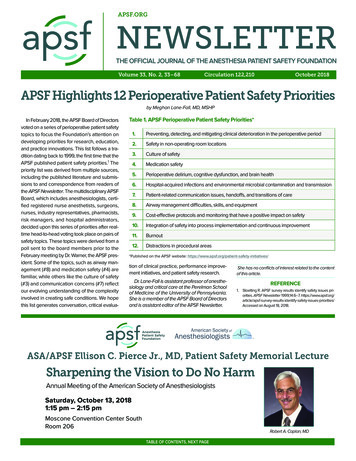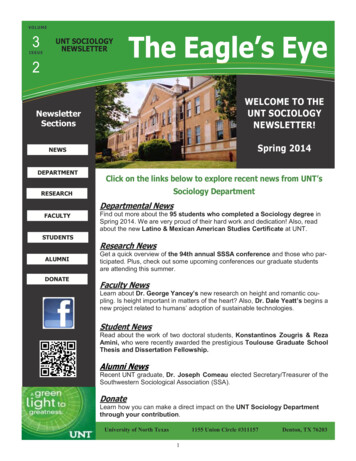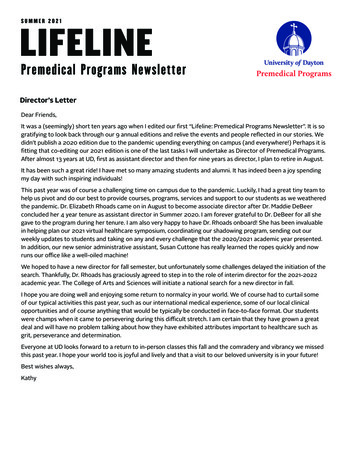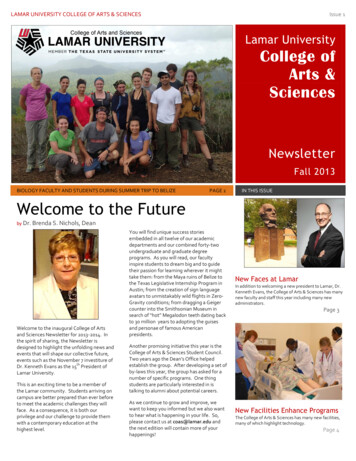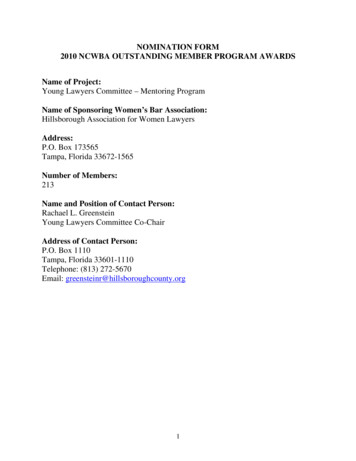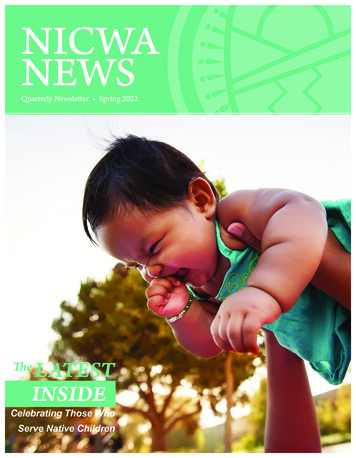
Transcription
NICWANEWSQuarterly Newsletter Spring 2022LATESTINSIDETheCelebrating Those WhoServe Native Children
National Indian Child Welfare Association5100 S Macadam Avenue, Suite 300Portland, Oregon 97239P (503) 222-4044F (503) 222-4007www.nicwa.orgThe National Indian Child Welfare Association (NICWA) is anonprofit, membership-based organization dedicated to the wellbeing of American Indian and Alaska Native children and families.Headquartered in Portland, Oregon, NICWA serves tribes,individuals, and private organizations throughout the UnitedStates and Canada by serving as the most comprehensive sourceof information on American Indian child welfare and acting asthe only national Native organization focused on building tribalcapacity to prevent child abuse and neglect.Our MissionThe National Indian Child Welfare Association isdedicated to the well-being of American Indianand Alaska Native children and families.Board of DirectorsPresidentGil Vigil (Tesuque Pueblo)Vice PresidentAngela Connor (Choctaw)SecretaryW. Alex Wesaw (Pokagon Band of Potawatomi)TreasurerAurene Martin (Bad River Band of Lake Superior Chippewa)MembersTeressa Baldwin (Inupiaq)Justine Bautista (Northern Cheyenne)Mikah Carlos (Salt River Pima-Maricopa Indian Community)Rose Domnick (Orutsararmiut Native Council)Brad Earl (Colville descent)Rochelle Ettawageshik (Little Traverse Bay Band of Odawa Indians)Patricia Carter-Goodheart (Nez Perce)Debra Foxcroft (Tseshaht First Nation)Robert McGhee (Poarch Band of Creek Indians)Gary Peterson (Skokomish)Robin Sigo (Suquamish Tribe)Mary Tenorio (Santo Domingo Pueblo)Board of TrusteesJohn Shagonaby (Match-E-Be-Nash-She-WishBand of Pottawatomi Indians)Brad Earl (Nez Perce descent)Sherry Salway Black (Oglala Lakota)Allard Teeple (Bay Mills Indian Community)Victor Rocha (Pechanga Band of Luiseño Indians)Derek Valdo (Acoma Pueblo)Founder and Senior AdvisorTerry Cross (Seneca)Executive DirectorSarah Kastelic (Alutiiq)NICWA News is the quarterly newsletter for members anddonors of the National Indian Child Welfare Association.Membership is available in multiple levels starting at 35.For reprint requests, additional copies,or other information, contact us at info@nicwa.orgContents45681011PolicyInside NICWACelebrating Those WhoServe Native FamiliesProgramsTrainings andEventsMembership
Message from the Executive DirectorDear NICWA Members, Sponsors, Donors, and Friends,Welcome to the spring issue of NICWA News. This issue embraces the theme of celebrating those whoserve Native families. I’m casting a wide net here. When I think about those serving Native families, I’mthinking of everyone from the formal child welfare program and huge array of family support services tothose community and culturally based supports focused on prevention and family well-being to relativesand neighbors who check in when they see a family struggling to offer help or support. According to ourtraditional beliefs and values, raising and nurturing children is a collective responsibility. I think of it as an“all hands on deck” enterprise. Especially given the challenging circumstances families face today, parentsand children could use support in lots of different contexts, and there are lots of opportunities for each ofus—no matter our formal role or relationships—to offer support.As you’ll read about in this issue, we’re on the heels of our incredibly successful 40th annual conferenceheld virtually in April. We engaged virtually with 1,346 of you in workshops, plenary sessions, talkingcircles, and our National Day of Prayer for Native Children. Our conference is a powerful reminder of thecommitment and impact of the workers in our tribal and state helping programs and systems. Thousandsof you have dedicated your careers to serving Native families and strengthening their well-being,intervening to stop the intergenerational transmission of trauma and creating a place for families to heal.Thank you for your hard work and for your heart for Native families.In this issue of NICWA News, we celebrate those who serve Native families. We offer appreciation andgratitude for your sense of community-mindedness; the reinforcement of our connectedness to oneanother, including the families we serve; and your commitment to keeping children and their familiestogether whenever it’s safe and possible to do so.With gratitude for your service to Native children and families,Sarah Kastelic, PhD, MSW(Alutiiq)
Policyand support Native children, youth, andfamilies through upholding ICWA. TheCampaign works to inform policy, legal,and communications strategies with themission to uphold and protect ICWA.House CommitteeHolds Hearing on Billto Establish IndianBoarding SchoolCommissionProtect ICWAUnited States Supreme CourtPreparing for Review of Brackeen v.HaalandOn February 28, 2022, the U.S. SupremeCourt issued an order accepting reviewof the Fifth Circuit Court of Appealsen banc decision in the Brackeenv. Haaland Indian Child Welfare Act(ICWA) case. Four of the parties to thecase filed petitions with the SupremeCourt asking for review of the decisionby the Fifth Circuit Court of Appeals,including the federal government, fourintervenor tribes, the State of Texas, andprivate parties (adoptive and foster careparents). The Court chose to consolidatethe petitions and will consider all of thequestions that were before the FifthCircuit Court of Appeals. The case will beargued before the Court sometime aftertheir new term starts in October of 2022.The briefing schedule in the case is asfollows.Briefing Schedule Texas and private parties briefs are dueThursday, May 26o Amicus briefs in support of theseICWA challengers are due Thursday,June 2 Department of Justice and tribalintervenors’ briefs are due Friday,August 5o Amicus briefs in support of theseICWA defenders are due Friday,August 12Amicus BriefProtect ICWA Campaign partner theNative American Rights Fund as wellas Dentons law firm are partneringwith tribal and ICWA legal advocates todevelop an overall amicus brief strategyand will reach out to tribes and Indianorganizations about the opportunityto sign on to a tribal and Indianorganization amicus brief this summer.We strongly encourage all tribes andIndian organizations to sign on to thetribal amicus brief. For more informationon how to sign on to the tribal amicusbrief, please email icwa@narf.org.About the Protect ICWA CampaignThe Protect ICWA Campaign wasestablished by four national Nativeorganizations: NICWA, the NationalCongress of American Indians, theAssociation on American Indian Affairs,and the Native American Rights Fund.Together, the Campaign works to serveWe need your help. As we head towards oral arguments before theSupreme Court this fall, the Protect ICWA Campaign will share calls toaction, educational resources, events, and social media tools to rally insupport of ICWA and grow the advocacy and collaboration we need to shutdown this challenge. Go to NICWA’s website and sign up for the Campaign'snewsletter. Follow @ProtectICWA on Twitter and Instagram.4 Spring 2022On May 12, the House Committee onNatural Resources held a hearing toreceive testimony on the “Truth andHealing Commission on Indian BoardingSchool Policies in the US Act” (H.R. 5444and S. 2907). The hearing was heldbefore the House Natural ResourcesSubcommittee for Indigenous Peoplesof the United States and witnessesincluded tribal leaders, boarding schoolsurvivors, a tribal college president, andthe National Native American BoardingSchool Healing Coalition (NABS).The legislation would establish acommission to facilitate public hearingson the policies and impact of boardingschools in the United States and developrecommendations on how to addressissues resulting from the boarding schoolexperience.NICWA provided written testimonyregarding the legislation:"The passage of this legislation will notonly further the process of healing forNative communities, but it also opensdoors to acknowledging and addressingother ways in which governmentpolicies and practices have evolvedover time and continue to perpetuateharm, including the current state ofdisproportionate treatment of AI/ANchildren in the child welfare system."What Can You Do? Contact yourcongressional members and ask themto sign on as a co-sponsor to the Senateand House bills and urge their passagethis calendar year. Visit www.nicwa.org/boarding-schools/ to find a list ofresources related to Indian boardingschools in the U.S. andhealing resources.National Indian Child Welfare Association NICWA News
Inside NIC WAMeet NICWA's Newest Board and StaffThe 2022 NICWA Board of Directors election closed on May 31, 2022, and NICWA’s members voted to accept the slatenominated at the annual membership meeting that took place during the Protecting Our Children conference. Current boardmembers Patricia Carter-Goodheart (Nez Perce), Angela Connor (Choctaw), Aurene Martin (Bad River Band of Lake SuperiorChippewa), Mary Tenorio (Santo Domingo Pueblo), and Teressa Baldwin (Inupiaq) were elected to new three-year terms.Additionally, two new members were elected to join the NICWA Board of Directors, Brad Earl (Colville descent) and JustineBautista (Northern Cheyenne). Please welcome NICWA’s newest board members, Brad Earl and Justine Bautista, and NICWA’snewest staff, Tara Reynon (Puyallup)!Brad Earl (Colville descent)Board MemberBrad Earl is the assistant superintendent of operations for the MedfordSchool District in southern Oregon and has a background in finance,administration, and nonprofit board service, including board developmentwork. He currently serves on the Board of Directors and chairs the FinanceCommittee for Access, a food bank in Medford. For more than a decade,Brad has served as an advisor to the NICWA Board of Directors on financialmatters and annually as a member of the board’s Audit Committee. Bradis passionate about seeing children learn and grow while valuing andprotecting culture and community.Justine Bautista (Northern Cheyenne)Youth Board MemberJustine Bautista is NICWA’s newest youth board member. She lives in thePortland, Oregon, metro area and makes frequent trips to the NorthernCheyenne reservation in Lame Deer, Montana, to connect with her familyand tribe. Justine works for the Native American Youth and Family Center inPortland, where she also volunteers extensively, and is a fancy dancer whohas always participated in pow wows. Justine’s lived experience in the fostercare system has inspired her to serve on the NICWA Board of Directorsas well as pursue a career in social services in order to be a voice forIndigenous youth—to let them know that she has been in their position andthat they are being heard.Tara Reynon(Puyallup)Child Welfare DirectorTara Reynon joined NICWA in May of 2022 as child welfare director.Tara is a member of the Puyallup Tribe of Indians and has served tribalcommunities for over 24 years. As a passionate advocate of Indian childwelfare, Tara has dedicated her career to serving tribal children and families.In 2014, Tara became a part time lecturer at the University of Washington,Tacoma where she developed and taught the Indian Child Welfare CourseCurriculum for master of social work students. Most recently, she served asthe tribal community wellness division manager at the Puyallup Tribe. Thereshe oversaw over 15 social service programs where she helped bridgecommunication gaps between departments, broke down silos, and built atribal system that works collaboratively and cohesively in meeting members’complex needs. Tara is excited to utilize this knowledge and expertise atNICWA as we work together in serving children and families nationwide.NICWA News National Indian Child Welfare AssociationSpring 2022 5
Celebrating Those W hoSer ve Native ChildrenWhat Does Being of Service to Community Mean to You? Essay ContestThe following excerpts are from the three individual winners from NICWA’s essay contest for social workers. In the last issueof NICWA News, and throughout the months of April and May, we asked current students of social work and experiencedsocial workers to write to inspire and encourage others to join the profession. Thank you to all the contributing essayists forsharing your words and for your service to our children, families, and communities every day.Hon. Daisy May Barrera (OrutsararmiutNative Council), Tribal JudgeService to community means to me,“Ikayucaraq,” to be a partner, a teamplayer, and to be of service to allNative and American Indian childrenregionally, locally, and nationally. As anAlaska Native woman, I attained mybachelor’s degree in the field of socialwork. Three years later, I graduatedwith my Paralegal law degree. At theage of 21 years old I participated in thedevelopment of the Indian Child WelfareAct, along with twelve other AlaskaNative social service directors. Today,to be 68 years old, within my scope asa tribal judge, I prioritize all efforts toimplement the Indian Child Welfare Act.The mentors in my life to date are my“Tegaaneqs” or elders who consistentlyencourage, guide, and assist in myfield. The best advice given to mehas been to treat each individual as ahuman being and to carry your field witha kind, loving, understanding heart withpatience. To this day, I'm honored to bea part of consistently encouraging thechanging of mindsets to all walks of theearth. Our children belong within theirown family unit and their community."Where there is a will, there is a way” tomake all things become a reality. Tina Burns (Seminole Nation),Seminole ICW WorkerI see how important we as socialworkers are for the families and fosterfamilies. We want the very best for ourkids, and we do all we can to providethat to them.I was given advice at the beginning ofmy career from an individual that I hadworked with. She had stated somethingalong the lines of, “Don’t take things sopersonally; this is not about you. Theway people talk to you and treat you6 Spring 2022is about them. Think about what theyare going through. For them, they aretaking out their anger on you becausethey see you as the enemy. You justhave to show them that you are in thiswith them, that you understand whatthey are saying, and that you are on thesame team.” At first, I didn’t understand.I could not understand how a personcould talk to me as they did and hownot to take it to heart.As the year turned into the next,I started to understand the words thatwere spoken to me. I realized themeaning. I took that advice and use itto this day. I want my clients to see meas an equal and to see me as beinga part of their team. I want to workwith the client and continue to try andmake a difference in their life. I want tohelp them get on the straight road andhelp them become better people forthemselves and their children. I want tobe able to give them a chance to seewho they are and who they can be. Iwant them to see just how importantthey are and help them understand theyhave a meaning and purpose in thisworld. They do not have to continuedown the path they are on. They canchange, and they can be different.There are so many individuals thatjust need someone to believe in them,see them, and help guide them. As asocial worker, I have learned so muchthroughout the years. As a socialworker, I have seen and experiencedthe importance of the work that wedo for our people and the state. Ihave been able to provide comfort,understanding, and support to ourfamilies. I have been able to givehope to them, and I have been able toreunite children with their parents andsiblings. When a child is taken out oftheir home and placed in foster care,they are confused, sad, angry, and feellost. They do not understand why theyare with others they do not know. A lotof times these children lose out on thevaluable teachings their families couldprovide for them: knowledge of theirculture, ethnicity, and race. By helpingthese families, we give the familieshope and stability. We do all we can tokeep families together.As social workers in the field, we areadvocates for our children and parents.We are sometimes the only stableperson in the lives of children. Childrenneed people that care for them,understand them, and help them. We,as a community, work together to givethese children and parents what theyneed. We help provide services to theparents and children. There have beentimes that we have been the ear forthem just so they have someone to talkto. We help guide them, and we do allwe can to help them be successfulin their time of need. Sue Van Zante-Peiser, GraduateStudent at University of MichiganWe are called "The Seasoned Ones" ingraduate school for social work. Thoseof us over 50 years old may havestarted our careers before many of ourclassmates were born. Spice is ourpassion. If we look at how a spice canchange the flavor of one roast chicken,we can choose to be paprika, blackpepper, or even garlic We try to guidepeople with grace and empower themto have agency over their lives, spicyor bland. It is not our choice. We arehere to support them with their goals. Itdoes not matter to me how long it tookme to answer the call to social work. Itmatters that I am still breathing and canoffer kindness. To do that with culturalhumility, empathy, and curiosity is a wayfor me to sleep better at night. National Indian Child Welfare Association NICWA News
Pictured above is the graphic art created by Viola Clark to capture the spirit of the closing general session, “IndianBoarding Schools: Working Together for Meaningful Change,” of the Protecting Our Children conference.Champions for Native ChildrenThis year, at our virtual 40th AnnualProtecting Our Children Conference,we were pleased to announce ourChampions for Native Children. Thisyear, we awarded an individual as wellas an organization winner.Cristi Heath (Choctaw)Cristi Heath has worked for theOklahoma Department of HumanServices for over 17 years, whereshe supervises Oklahoma’s shelterteam and several group homes,oversees a portion of the intellectualdisability process, and participates in amultidisciplinary team. Cristi’s primaryfocus is kinship, and her passion is tore-establish Native youth with familywhenever possible and at every stageof a case.NICWA News National Indian Child Welfare AssociationCarrier Sekani Family ServicesFor 30 years, Carrier Sekani FamilyServices (CSFS) has offered culturallyrelevant services to children andfamilies of 11 member nations innorthern British Columbia. They operatethrough a community-based model thatworks with First Nations leadership tomeet the needs of Carrier and Sekanipeoples as well as non-Indigenouspeoples who live in the vast regionof Northern British Columbia. CSFSis renowned for its development andprovision of culturally responsive andaccessible services that promote thewell-being and self-determination of thenations it serves.Congratulations to our 2022 Championsfor Native Children! We are grateful foryour service and dedication to Nativechildren and families.Spring 2022 7
ProgramsJoin the Grandfamilies & Kinship Suppor t NetworkKinship and grandfamilies are formedout of love and necessity when relativesand friends take on the responsibilityof raising children whose parents areunable to do so. Research showsthat children are more likely to thrivein kinship and grandfamilies than innon-kin foster families. However, manykinship and grandfamilies lack thesupport they need. Too often, state andtribal systems and policies are aimed atparents and do not consider or respondto the strengths and needs of kinshipand grandfamilies.The Grandfamilies & Kinship SupportNetwork (Network) is the first-evernational technical assistance centerfor those who serve kinship andgrandfamilies. The Network exists, freeof charge, to support state and tribalgovernment agencies and nonprofitorganizations to collaborate and workacross jurisdictional and systemicboundaries—all to improve supportsand services for grandfamilies andkinship families.With funding from a five-yearcooperative agreement with the U.S.Department of Health and HumanServices’ Administration for CommunityLiving, Generations United operates theNetwork with four partners: NationalIndian Child Welfare Association,National Caucus and Center on BlackAging, USAging, and ZERO TO THREE.A fifth partner, Child Trends, evaluatesour work.The Network will create lasting changefor families around the country byconnecting and supporting: Leaders in elder/senior/agingservices, child welfare, disability,education, housing, nutrition,Medicaid and Medicare, andTemporary Assistance for NeedyFamilies government agencies instates and tribes; Kinship navigators; and Leaders of community and faithbased organizations.While the Network is not designed tohelp individual kinship or grandfamilieswith their specific cases, they willbe at the core of our work, guidingand informing it. By targeting thoseorganizations and providers that directlyThe Network exists, free of charge, to support state and tribalgovernment agencies and nonprofit organizations to collaborate andwork across jurisdictional and systemic boundaries—all to improvesupports and services for grandfamilies and kinship families.8 Spring 2022serve the families, the Network canhelp guide systemic reforms to supportkinship and grandfamilies now and intothe future.Join the Network, and you can learnfrom a nationwide network of yourpeers and access seamless supportand resources from renownedexperts with a wide range of subjectmatter knowledge—doctors, lawyers,caregivers, social workers, and policyand program experts across an array offields.Participants will have the opportunityto access virtual convenings; learningcollaboratives and informationdissemination; targeted, specializedsupport; and a centralized resourcehub. Sign up to access all of thesesupports, including interactive learningopportunities, a monthly newsletter,and other resources. You will learn fromothers, share your knowledge, and helpcreate seamless kinship supports inyour community—all free of charge.Look for a summary of the June 7virtual tribal convening for agenciesand organizations to learn from theirpeers, create action plans to improvecollaboration and effectiveness, andshare promising practices and programsin the next issue of NICWA News.National Indian Child Welfare Association NICWA News
Oregon CommunityFoundation PIPGrant UpdateNICWA is at the halfway mark of aproject to update its Positive IndianParenting (PIP) curriculum. PIP, theleading culturally specific parent trainingcurriculum in Indian Country, has beenin continuous publication and use since1987. The lead author, Terry Cross, isnow updating the curriculum manual. Theoriginal manual consisted of two majorparts including five chapters on parenttraining, followed by an instructionalguide for eight sessions. These sectionswere followed by resource lists. Thecurriculum is culturally based both in itsmethodology for how to train parentsas well as its content about Indianparenting approaches. PIP was lastupdated in 2016 when a new appendixof resources was added. To date, TerryCross has added three training relatedchapters, specifying delivery approachesand guidance for in-home instruction,virtual instruction, and local adaptation.PIP trainers Lorraine Brave and AlexisContreras are providing invaluable inputon updating instructional techniquesand strategies. The next step is torevise outdated discussion questionsand exercises and to add exercisesspecifically designed to use for in-homeand virtual instruction. The updatedcurriculum will be piloted this fall andavailable for use by the end of the year.NIC WA Par tners withOregon Depar tmentof Human Ser vicesOffice of Tribal AffairsOn April 26, the Oregon Department ofHuman Services (ODHS) Office of TribalAffairs conducted its first ICWA/ORICWASummit, entitled Healing and RestoringThrough the Relational Worldview Model.The core team planning the event wereAdam Becenti, director of tribal affairsfor ODHS, and Ashley Harding, seniorICWA manager. Both are former staffof NICWA. Terry Cross of the NationalIndian Child Welfare Association andJillene Joseph of the Native WellnessInstitute were the instructors for thissix-hour virtual summit. The summitwas made possible by a grant from theCollins Foundation to NICWA, reachingapproximately 150 participants. TerryCross presented three 90-minutesessions on the Relational WorldviewModel as a basis for child welfarepractice and illustrated how the Americanlinear worldview-based state childwelfare system falls short of meeting thediverse and complex needs of AmericanIndian and Alaska Native families. Thepresentation demonstrated the continuingneed for ICWA and the value of havingstate ICWA legislation such as ORICWA.The model helps workers understandwhy active efforts are more than a boxto check—they are a vital practice tohelp families heal from the historical andstructural challenges that contribute tochild maltreatment. Jillene Joseph closedthe day with a session on healing thehealer, acknowledging the difficult workthat direct line staff and others do daily tokeep children safe.NIC WA Values LivedE xperienceAt NICWA we value having people withlived experience at the table. Those withlived experience—parents, youth, andcaregivers who have been involved withthe child welfare system—are the oneswho know best about what is working welland what is not. They are the experts intheir experience and have a lot of insightand expertise to offer to improve servicesand policies for all Native children andfamilies; many times, they just needthe invitation to the table to share theirperspectives and experience. NICWAdoes this whenever possible, includingholding panels at conferences andconvenings and bringing on a new youthboard member with lived experience.As Native people we may share a historyand even have similar experiences, butthe paths that our journeys take areunique and give us diverse perspectives.Adults with child welfare systeminvolvement: At our virtual 40th annualNICWA News National Indian Child Welfare Associationconference, Lukas Angus (Nez Perce),Kendra Mylnechuk (Lummi), and DaryleConquering Bear Crow (Oglala Lakota)joined a panel to discuss their livedexperience as children with the childwelfare system and their homecomingjourneys. Each had a very differentexperience which contributed to a richconversation facilitated by NICWA BoardMember Stephanie Weldon (Yurok).Native youth: NICWA welcomed newyouth board member Justine Bautista(Northern Cheyenne) to the board thisspring. Justine is a young person withpassion for her culture and helpingothers. She also has lived experience inthe foster care system. You can read herbio on page 5.Grandfamilies: At our June 7 virtualtribal convening sponsored by theGrandfamilies and Kinship SupportNetwork, we invited a group ofgrandfamilies, or kinship caregivers, toshare their experience with navigatingsystems that often do not offer muchsupport to families raising their relativechildren. The goal was for tribal serviceproviders and system leaders to beinformed by those with lived experienceso they could strengthen collaborationbetween systems and improve theirability to serve kinship care providers andtheir relative children better.Services, programs,or policy that aresupportive of andhealing to Nativefamilies need tobe developed inpartnership withpeople that knowthose systemsfirsthand.Spring 2022 9
Trainings and EventsUpcoming NICWA TrainingsICWA is upheld and the tribe’ssovereignty is respected. One stepwas to schedule ICWA hearings atthe Tribal Court on the SeminoleTribe Reservation. Conducting thehearings on the reservation was verysignificant in that it provided tribalmembers a level of comfort being infamiliar surroundings at their tribalcourthouse. As Judge Izquierdopoints out, “Dependency court istherapeutic in nature and has as itsgoal the reunification of children andtheir families.”Here at NICWA, we know thatraising and nurturing children isa collective responsibility and anhonor. To support you in your workwith Native children and families,we offer a variety of in-person andvirtual learning opportunities to meetyour needs. We are excited to shareour learning opportunities with you!In addition to our training institute,we also offer a newly updated,self-paced online Working withSubstance-Abusing Families courseas well as Introduction to ICWA. Formore information or to register forthese exciting opportunities, pleasevisit www.nicwa.org/training-institutes.“Overall, what I enjoyed mostwas the connections I made withother facilitators. It’s important toknow we aren’t alone in this work.The Positive Indian Parentingcurriculum allows communities totailor to fit our unique needs andcultural values. I would recommendthis training in-person or virtualto anyone working with Nativefamilies.”10 Spring 2022Celebrating JudgeJose Izquierdo andSeminole Tribe ofFloridaFor more than 15 years, the SeminoleTribe of Florida has partnered withNICWA as a Host Sponsor of theProtecting Our Children conference.NICWA’s executive director SarahKastelic noted, “I am honored bythe continued generosity of theSeminole Tribe of Florida. In 2006,the tribe became a tribal member ofNICWA and has grown as the tribehas become one of our strongestcontributors as Host Sponsor. Itis the support of sponsors thatmakes NICWA’s annual conferencepossible.”This year, we are excited to celebratethe Seminole Tribe’s collaborationwith 17th Circuit Court JudgeIzquierdo.Dependency Judge Jose Izquierdohas worked in tandem with theSeminole Tribal Court to ensureManaging ICWA cases is one ofthe Seminole Tribal Court’s mainresponsibilities, and the tribe has hada relationship with the 17th JudicialCircuit Court of Florida for severalyears—specifically its dependencydivision—to do that. Dependencycases include situations with childrenwho are abused, abandoned, orneglected and might be removedfrom parents. Outcomes can resultin reunificati
5100 S Macadam Avenue, Suite 300, Portland, Oregon 97239 PHONE: (503) 222-4044 FAX: (503) 222-4007 WEB: www.nicwa.org NON-PROFIT ORGANIZATION U.S. POSTAGE PAID PORTLAND, OR PERMIT NO. 567 Host sponsor Four Directions Sponsors Sacred Circle Sponsors Morning Star Sponsors Council of Friends Sponsors Protecting Our People
